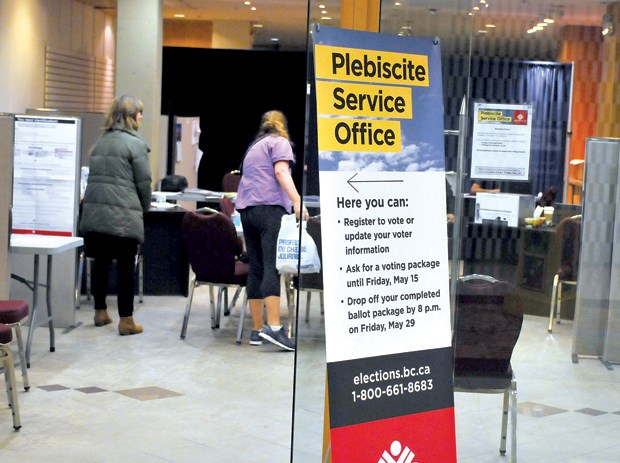It’s all over now but the counting — of about 700,000 ballots.
But it will likely be another couple of weeks before the result of the TransLink plebiscite is tallied, say officials at Elections B.C.
Of those votes, North Shore residents cast more than 61,000 ballots.
The District of North Vancouver had one of the highest voter turnouts in the Lower Mainland, with more than 50 per cent of registered voters — over 30,000 residents — returning ballots. Voter turnout in the City of North Vancouver and District of West Vancouver was also high at over 47 per cent of registered voters.
Residents were asked to vote Yes or No on whether to accept a 0.5 per cent sales tax increase in the Lower Mainland to fund transit expansion. Those projects include more buses, including more frequent SeaBus crossings, a Vancouver subway line and light rail in Surrey. If approved, the new tax is expected to bring in about $250 million a year.
District of North Vancouver Mayor Richard Walton said he’s not surprised by the high voter turnout in his municipality.
“A lot of people I know as mayor, all they wanted to talk to me about was TransLink and public transportation,” he said. “We’re a fairly well educated and informed community,” he added. “There are a lot of people here who would understand and take an interest in regional issues.”
The tendency to vote is also related to education and income, Walton said. But he added just because a lot of people voted doesn’t mean they voted Yes.
Both Walton and City of North Vancouver Mayor Darrell Mussatto campaigned for the Yes side, while West Vancouver Mayor Michael Smith was one of the public voices on the No side of the discussion.
Canadian Taxpayers Federation director and No side spokesman Jordan Bateman criticized the Yes side during the campaign for spending an estimated $6 million to convince voters of the plan’s merits.
Walton said spending the money was a necessary evil. “None of us wanted this referendum at all. The province threw this out and said this is the route you have to go,” he said. But it would have been impossible to have a crack at winning a Yes vote without spending the cash, he added. “That’s a public information exercise that costs a lot of money.”
The Mayors’ Council is to meet June 11 to discuss next steps following the vote. But it’s likely the results won’t be in by then.
Don Main, spokesman for Elections B.C., said he doesn’t know yet how many last-minute ballots had been received by voting centres and couriered to Victoria. Tallying votes itself is a multi-step process, he said, involving verifying the voter against provincial lists, then separating the envelope containing the actual ballot from any identifying information. Those steps all happen manually, he said. In the final step, ballots will be scanned and counted electronically in batches of 1,000.
Main said Elections B.C. hopes to report the final result to the province and the public by the end of June.



